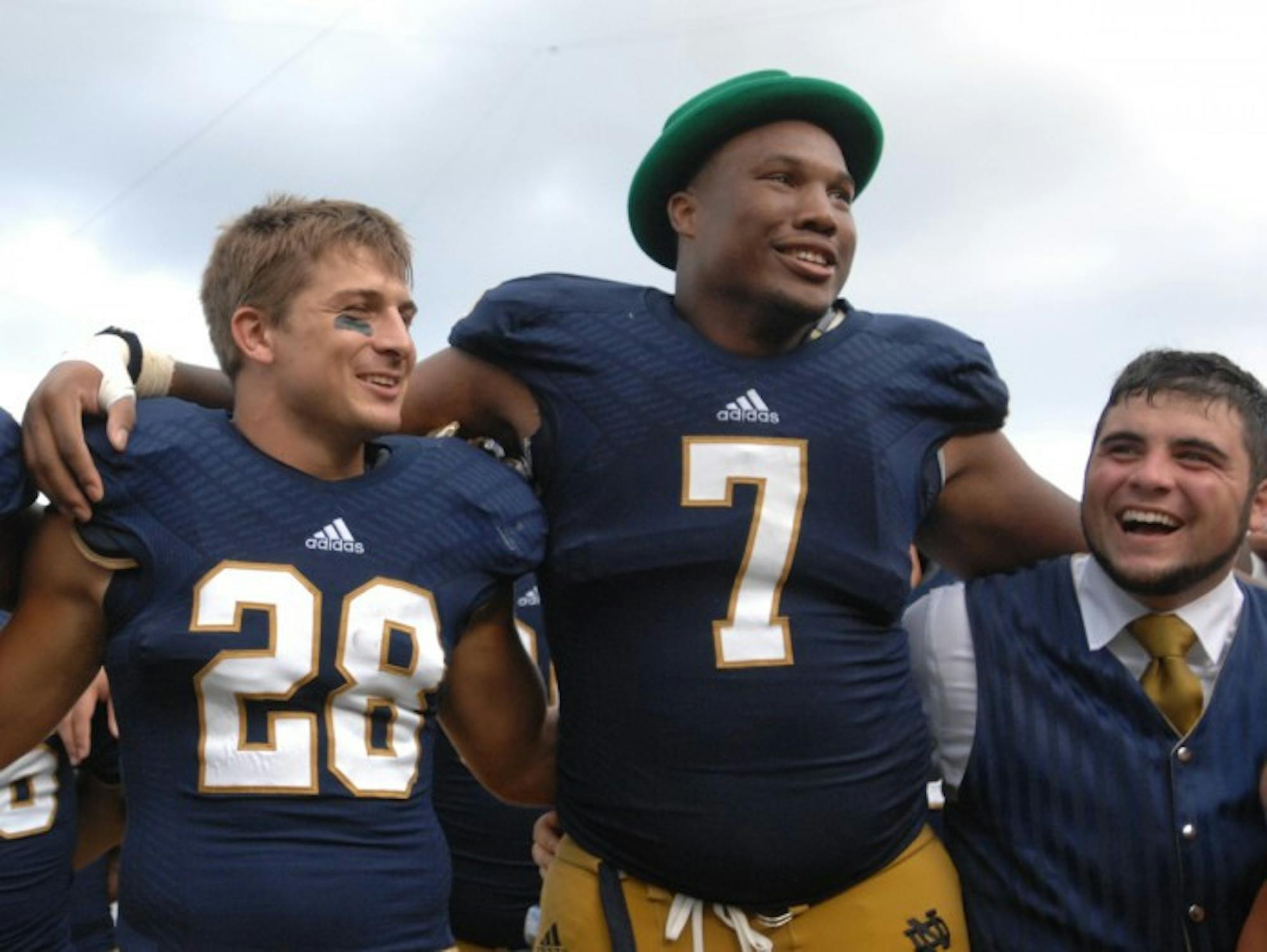One of the most hotly contested debates surrounding the 2013 Notre Dame football team leapt once more to the forefront of conversation Monday as team leaders and representatives from student government met to finalize the players’ decision to sing the Alma Mater after every home game, regardless of outcome.
“The fact that this decision was not made by football players alone or by the students alone is a testament to how unified we can be as a student body,” Irish sophomore receiver Corey Robinson said. “The Alma Mater is as an avenue where we can stand together as a unified body and celebrate our common bond: love for Notre Dame.”
Robinson, who also represents athletics in student government, said the Unity Council voted unanimously to sing the Alma Mater after every game, a decision that was “nearly unanimously” supported by the team as a whole and reflected the team’s desire to continue a relationship of mutual respect with fans in the student section and beyond.
“We were really thinking of the entirety of Notre Dame nation when we made the decision,” Robinson said. “We chose to sing because we appreciate that it's bigger than just us football players, even us students.
“The bottom line is the Notre Dame community is a family,” he said. “Regardless of whether we are celebrating a win or grieving a loss, the most important thing is that we stay together. I can think of no better way to demonstrate this unconditional bond then singing the Alma Mater together after every home game.”
The Unity Council made its decision independent of Irish coach Brian Kelly and Director of Athletics Jack Swarbrick, Robinson said. He said Kelly, Swarbrick and the coaching staff “encouraged” him to collaborate with student government in a “joint student effort” to address the issue.
“Coach Kelly, his staff and Jack Swarbrick empowered us to make the decision as players,” Robinson said. “They were in communication with us throughout the decision making process and supported our decision as a team.”
Farley said the team’s ability to freely determine this season’s Alma Mater policy demonstrated the commitment of players, coaches and administrators to honor the tradition as a way of connecting student-athletes to their peers.
“I … think it's incredible that Coach Kelly and Jack Swarbrick allowed us to make the decision for ourselves,” Farley said. “In my opinion, it makes the decision to continue singing the Alma Mater much more genuine and real coming from the team, especially when there could have been a lot of division amongst us.”
Vidal, Devine and Carroll presented Robinson and Farley with a booklet containing student opinions on the Alma Mater to keep the players informed of their peers’ perspectives, Vidal said.
“The books contain about 100 quotes from the students — each quote represents that student’s interpretation of the alma mater and what it means to them and our University,” she said.
The statements in the booklet mirrored the enthusiasm for the tradition that Robinson and Farley expressed, often lauding the Alma Mater as a symbolic reminder of the values and community within the University as a whole.
“Notre Dame values family, faith and community,” senior Shannon Hagedorn said in the booklet. “The players on the team are part of the family and the score at the end of a game played on a Saturday in the fall doesn’t change that fact.
“… The Alma Mater is a symbol of our connection, our spirit and our strength in the light and in the dark. Allow the players to sing and sway with their brothers at the end of the day. We belong together.”
Senior Kristen Parkinson, president of the Leprechaun Legion, likened the Alma Mater to "a celebration of the Notre Dame family."
"The Legion welcomes the return of this tradition, and we look forward to standing as a united student body, on- and off-the-field, on Saturday," she said in an email.
Controversy surrounding the singing of the Alma Mater first arose after several players left the field of Notre Dame Stadium following the team’s loss to Oklahoma on Sept. 28 without stopping at the student section to sing. The action sparked intense debate among students, alumni and fans, many of whom saw the former policy as equating community with winning alone.
“To my understanding, the official policy last season was to not sing the Alma Mater after home losses,” Robinson said. “It was an issue that may have even been decided much earlier than last year, but since we hadn't lost at home in two years, the policy was not well-known or practiced.”
In a press conference Tuesday, Kelly said he raised the issue with the Unity Council and invited its members to revisit the policy.
“I addressed it last year with the Unity Council,” he said. “We decided as a team that's not what we wanted to do. This year we brought it back up to the Unity Council, and they voted that's something that they wanted to do, so I'm all for what my team wants to do, and we will make that work."
Robinson said some players had expressed concern regarding previous incidents of students booing the team and throwing objects on the field, such as frozen marshmallows during the Nov. 23 game against BYU.
“We understand that this is a intense game, but we hope to be treated with respect when we sing the Alma Mater with the student body and fans,” he said.
Farley said the Unity Council primarily sought to promote “the respect of both the team for the fans and the fans for the team.”
“I would hope that the student body will understand, just as we have, that the singing of the Alma Mater is bigger than all of us and really bonds us together,” he said. “I know that I can speak on the behalf of the team, and there won't be any behavior issues on our part.”













